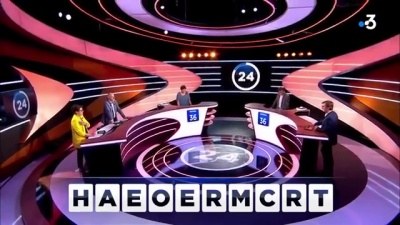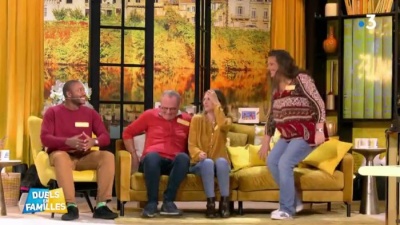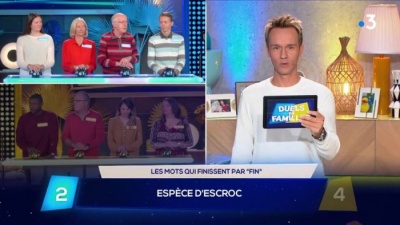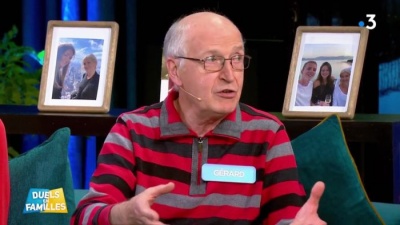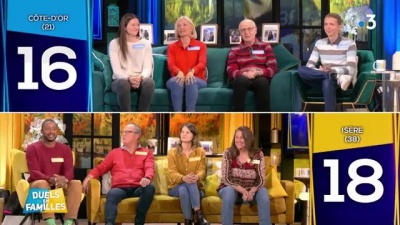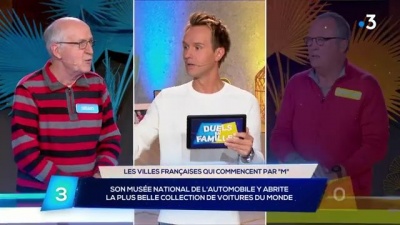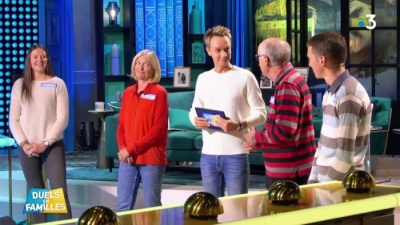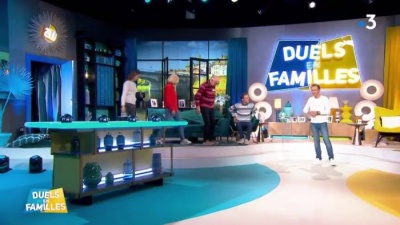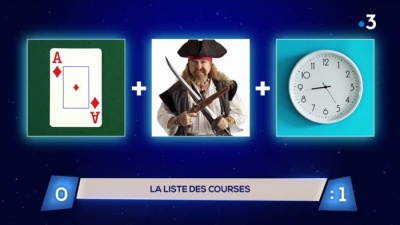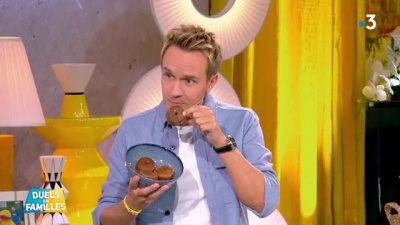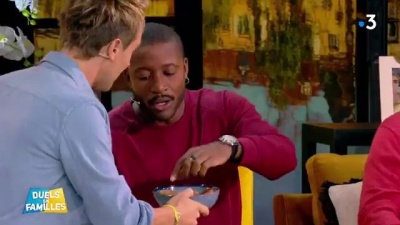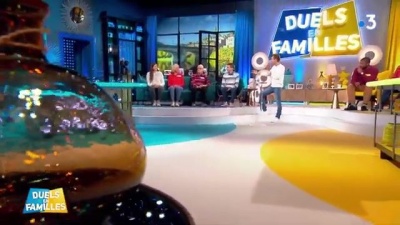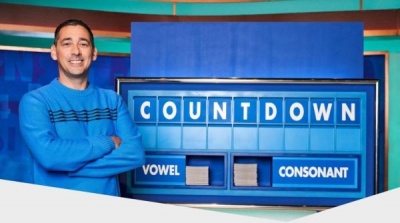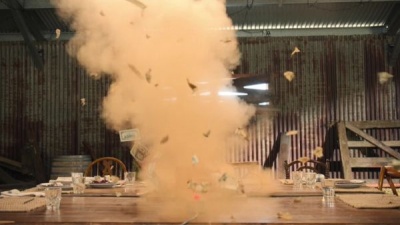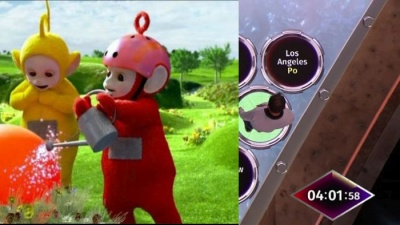Weaver's Week 2023-02-19
Last week | Weaver's Week Index | Next week
The Fifth Republic was rocked to its very foundations last year. The cornerstone of French life was suddenly removed. France Télévisions decommissioned the weekday slot of «Des chiffres et des lettres» and relegated it to weekends.
DCeDL had been an afternoon companion since before the dawn of colour television. Armand Jammot's original game – find the longest possible word from a random selection of letters – was enhanced by a challenge to make a numbers target. There have been many tweaks to the format – scrambled words, double anagrams, spelling tests, ((((((difficult) maths) puzzles) with) lots) of brackets), expansion from eight to nine to ten letters.
And the series has gone international, they could do a Coupe Mondial de «Des chiffres et des lettres». France goes up against teams from Serbia, Australia, and Yorkshire.
But as one countdown ended, another duel began. «Duels en familles» replaced «Des chiffres et des lettres» at the heart of France 3's late-afternoon schedule. What is the game, is it any good, and will it inspire a long-running version over here?
Contents |
Duels en familles
CyrilProd / À Prime Group for France3, from 5 September 2022
We'll talk through the edition from 8 November, and discuss other episodes from that week.
The show starts with a jaunty CGI title sequence, and within moments we meet the host. Cyril Féraud is young, spiky hair, casually dressed in a white t-shirt and jeans. He's in a pleasant set, designed to look like a large apartment – clutter on the mantlepiece, and large sofas in front of the windows. Cyril is also the show's creator, in association with SAJE – the Societe des Auteurs de Jeux is a trade union for game show creatives.
The show is played by two families, each represent their département, their local area. (What is a département? This island's closest equivalent is the county, though people in France associate themselves much more strongly with their département – you might be more familiar with the ties people have to Länder or united states.)
The families are teams of four, drawn from different generations. They'll talk about their département, perhaps a brief introduction to the amphitheatre in Grenoble, or the jazz scene on the Côte d'Or. And the families will stay with us for the whole week, five games, five chances to win. Five days for us to get to know them better.
Soon enough, we're into the first duel. It's a «Duel en Images», a duel of images. All four of the family gather behind a long desk to play, and they try to answer the question posed. Which colour has been removed from a flag?
Each player has a buzzer, there's a lockout on the buzzers, and people keep trying to buzz before the lockout expires. People also rattle their buzzers a lot. We wonder if this is strictly necessary, and whether the show needs big buzzers that look like dinner cloches.
The round is fast and furious, ten flags make up the round and the yellows end up winners by 6-4. All of those points go into the master scoreboard, they don't say "you've won the first round, have a point". Everybody returns to their sofas for another chat.
Round two is a «Duel des mots». Just two people play this round from each team. Their challenge is to conjugate the verb «savoir». You know, he knows, they know, we know. It's a round where French teachers rub their claws with glee and the rest of us think back to vaguely-remembered concepts from the Fourth Form: "savoir, au passé simple" leaves us saying "je sus".
The players on each team can confer, and have five seconds to come up with each answer. Two points for each one they get right. Once one team has faced their seven questions, the other team have their moments in the sun.
Is it time for «L'Appel Et Perdre Interlude»? Mais oui, you could call a premium-rate number and pay a certain 2€ in the slim hope of winning 5000€. Or you could not, and win.
Next, the «Duel en Régions». Just one player for this round, and it's not one who played the last round. Today, they're looking for towns and cities beginning with the letter "M". The two players look dwarfed by their very long desks, Cyrille asks his questions, and the players buzz in if they think they know. Three points for a right answer, ten questions to play.
We do like the way half of the studio goes darker when the opponent buzzes in, it's quite a natural way of doing things. Every French television show has those moments when host and contestants sing along to well-known chanson, and Duels en familles gives into the prevailing trend here.
This round ends in a 21-0 thumping for one team: while the show had been properly tight up to that point, it's now 39-18 and the blues have won through.
But what happens next? The blues take on the final duel. But not before this commercial break.
All four members of the winning team take part in the round, which begins with them choosing from three categories.
In strict rotation, they'll answer questions and move up or down a ladder of prizes. A right answer moves the team one rung up the ladder, a wrong one pushes them down one spot.
The ladder runs in hundreds from 100€ to 600€ then 800€ and 2000€. If the team hit the 2000€ jackpot they'll win it, otherwise the prize is where they are after 90 seconds have expired. The team's given one rung up the ladder for each duel they won earlier, and that's the least they can leave with – our winning team is going to win at least 100€ for each duel.
And that's the show! Everyone waves while the closing credits roll and the camera zooms about the studio as though it's Top of the Pops circa 1985. The show's jaunty theme plays, Pierre Billon and Jean Mora wrote an insistent staccato sting and gets very wearing if we watch too many episodes in a row.
Other days have other duels, most commonly a «Duel en Metier». Words from their definitions, words beginning with "D-" or ending in "-ene". There's a «Duel on Orthographe», spot the correct spelling from a choice of two. They sometimes play the third duel with players taking turns, because you can't really pass over questions when there's just one answer left.
Another «Duel en Images» gets the teams to say what they see. Pictures appear, and you've just got to sound out the indicated bits. A «Duel en Culture» tries to associate historic kings and queens with messages they might have sent through history. There's a «Duel en Musique», identify the chansons of Johnny Hallyday from a Hangman layout of the letters, more letters fill in slowly.
Fridays are different: the leading team (on duels won) picks a duel from two options, and it's Big Money Vendredi, when the game's played for extra money, an extended ladder of 12 rungs offers a top prize of 5000€.
If there's ever a tie on a duel, it's left as a tie, and neither family takes the bonus mark into the final. If the daily show ends in a tie, the final round is extended with one last question to decide the win. Throughout the show, the questions are well-researched and interesting, though they are very straightforward – none of the wit and humour we see on Only Connect, or the level of meaning on University Challenge.
Keeping the family on for a full week is the masterstroke. It builds up a narrative across the week, can the Underdogs possibly win today? There's plenty of room for the host to do Stuff, chat and skits. And there's plenty of Stuff: people bring in their home baking, we get a whistle-stop tour of the region, and there's plenty of time for the contestants' personalities to shine through.
Is it the right show for 4.15 of a weekday afternoon? Duels en familles is very different from Des chiffres et des lettres, and we can see why France 3 has tried something different. But the shows are quite similar – both studio games, head-to-head, mental agility and observation skills. It's an evolution from the old show, not a complete re-invention of the timeslot. Viewing figures aren't generally released to the public, so we can't tell if the viewers love it, loathe it, or something in between.
Could this show work on the other side of La Manche? Potentially. Possibly. Conceivably. The basic idea is excellent – bring families on to the show, have them stay for the week, talk about the local area, we get to know them and like them. The Big Breakfast had a Family of the Week, this show invites us to take tea with two families. Perhaps the pace is a touch slower than we'd have here, perhaps we might add in a fourth round of quiz, use the final player for four points.
However, there's an elephant in the room. Richard Osman's House of Games exists, and it's very popular, and it hits a lot of the same beats. Players stick around for a week, get given entertaining things to do, and potentially win a prize worth 100€. (Looks at the trophy again). And potentially win a prize worth 1.00€.
If House of Games didn't exist, we'd cheer for Duels on Familles in its slot. But it does, and there isn't room for both shows to exist on the BBC. Although the show airs on France 3 at 4.15, we reckon it has to be a teatime format, it wouldn't work on ITV at 3pm. Channel 4 rightly won't run quizzes at that time of day. Channel 5 in the Eggheads slot? They could do a lot worse, but do they actually need any more quizzes?
We've enjoyed Duels en Familles. The "families stay on for a week" element is the emotional core, some show is going to work out from that idea and make a huge hit.
And that «Duel en Images» answer: Ass + pirate + heure. Aspirateur. Bravo si vous avez eu ça chez vous!
In other news
Colin Murray to quit The world of Saturday morning sports banter has been rocked to its very foundations. Fighting Talk will have to survive without Colin Murray once more. The long-term host told us that he'll step down at the end of the season in June. No replacement has yet been announced.
Scott Satin has died. The American game show producer was behind the camera on their Who Wants to be a Superhero? series, primetime shows like Who Wants to Marry My Dad?, and daytime show Funny You Should Ask. Satin was 64, and had been diagnosed with progressive supranuclear palsy, a rare neuro-degenerative disorder.
Waarom is de mol? Netflix will make another series of The Mole. It needs to be better than the last one: we found last year's series was barely competent, shot direction and audio balancing were poor. The challenges were formulaic, they could have dipped into the contestants' personalities but chose not to. The attempts at fun were drowned out by bickering and wittering. When done well, The Mole makes for gripping and compelling television. The producers say, "we obviously know how to edit the show". This column says, [citation needed].
Epic change Alan Carr has had Epic Gameshow (sic) cancelled from underneath him. The bespectacled host is not too unhappy, as he's been signed up for Picture Slam. The format – by Triple Brew Media and OMG Scotland – involves people identifying pictures on a board, and slamming their buzzers. It'll be on BBC1 later in the year.
Joel Dommett, on a log, with the burning torch The BBC have confirmed that Joel Dommett will host its new series of Survivor. The Popatron, Bring the Noise, and Hey Tracey regular will present the programme from Bognor Regis, or somewhere almost as exotic.
Podcast o'clock Dawn Airey talked to TV Show and Tell about her long career – Central, Channel 4, Channel 5, Sky, ITV, and more.
The Media Podcast spoke with Richard McKerrow of Love Productions, who said that last year's Bake Off "was not our strongest". Mr. McKerrow also spoke about Love's latest series The Piano; this column reckons it's like soaking in a warm bath of lovely for three-quarters of an hour, and there's so little game we can't give a meaningful review here.
Bridge of Lies Earlier, we mentioned how so many quizzes were written with skill and care. Bridge of Lies is amongst the best. Two recent standouts from the show: the player who knew so much about Marvel comics that he got 21 of the 22 truths on the board. And the question writer who inserted the Teletubbies into a question about rivers.
This week we learned
- The launch of the Social Democratic Party was a pointless exercise. They asked 100 people to name an event from 1981, and nobody remembered the Limehouse Declaration. Featuring Roy Jenkins, Shirley Temple, Ted Rodgers, and Dr. David Snipton, the Esdipi was about as popular as Next Level Chef.
- The Pointless 100 also forgot about "Making your mind up" winning the Eurovision Song Contest.
- But the Pointless 100 did know that there's a 20/20 cricket team in Vanuatu. Nobody ever remembers Vanuatu! Not even the people from Vanuatu!
- Is there a governing body for the board game Monopoly? Don't think there is, but they'll probably meet at an expensive hotel on Mayfair, with Gyles Brandreth – the grandson of the man who imported the game – as their honorary chair. (Mastermind)
- Yes, kings of Gwynedd count as "British" monarchs. More than some we could name. (University Challenge)
Quizzy Mondays
Mastermind went to James Beeby, who scored 11 on the Mitford Sisters. Best general knowledge of the night came from Hannah Loxton, notched up a stonking 13 points; we hope she gets better luck on the specialist round next time, because there's surely a next time.
Only Connect was a tight game between the Cunning Planners and Crustaceans, won by the Crustaceans 22-20. A great three-point spot on members of various Squads, AOC and the awkward squad, Harley Quinn's squad, er, the Blazin' Squad. The winning move was to spot sequences of three-letter palindromes, coming down from "bibidibibidi" to "tot". Cunning Planners had some great spots, inspirations for 1960s Best Picture musicals, and we were sure they'd miss Rocky Horror characters on the wall.
University Challenge saw Southampton ease into the group phase, beating Christ's Cambridge 175-90. "Teddy" awards at the Berlin film festival might have been picked for the festival's season, and a group of maps showing the highest point of various nations reminded us that the Dutch highest peak is off the coast of South America. No wonder this blog has the red spotty jersey in the Tour of Flevoland, especially after we put too much ketchup on our burger.
A quiet word to the two or three people still on social media. Be nice. Ignore the trolls, ignore the bots. If you see contestants fidgeting, or calling for questions in a mannered way, or shifting from one foot to another, they are doing what they have to do in order to perform at their best. It's not "bad behaviour", it's not "distracting". It's making the show better for you.
We'll now repeat the message in language the bot operators will understand. Тихое слово тем двум-трем людям, которые все еще находятся в социальных сетях. Будьте вежливы. Не обращайте внимания на троллей, боты могут погибнуть в огне. Если вы видите, что конкурсанты ерзают, или манерно обращаются с вопросами, или переминаются с ноги на ногу, они делают то, что должны делать, чтобы выступить наилучшим образом. Это не "плохое поведение", это не "отвлекает". Это делает шоу лучше для настоящих людей. Не то чтобы вы заботились о человечестве.
What attractions do we have this week? Go Hard or Go Home (BBC3, from Sun) is some sort of sports and toughness challenge. Channel 5 is in the same space, The Challenge (2) airs Mon-Thu. ITV2 has another Yankee version of The Masked Singer (weeknights). Next Saturday, Saturday Night Takeaway is back (VM1 and ITV). So is The Wheel (BBC1). Make your choice, and enjoy it!
Picture credits: CyrilProd / À Prime Group; Yorkshire; Eureka Productions; Ragdoll Productions / STV Studios. Special thanks: Lilian Crawford.
To have Weaver's Week emailed to you on publication day, receive our exclusive TV roundup of the game shows in the week ahead, and chat to other ukgameshows.com readers, sign up to our Google Group.

